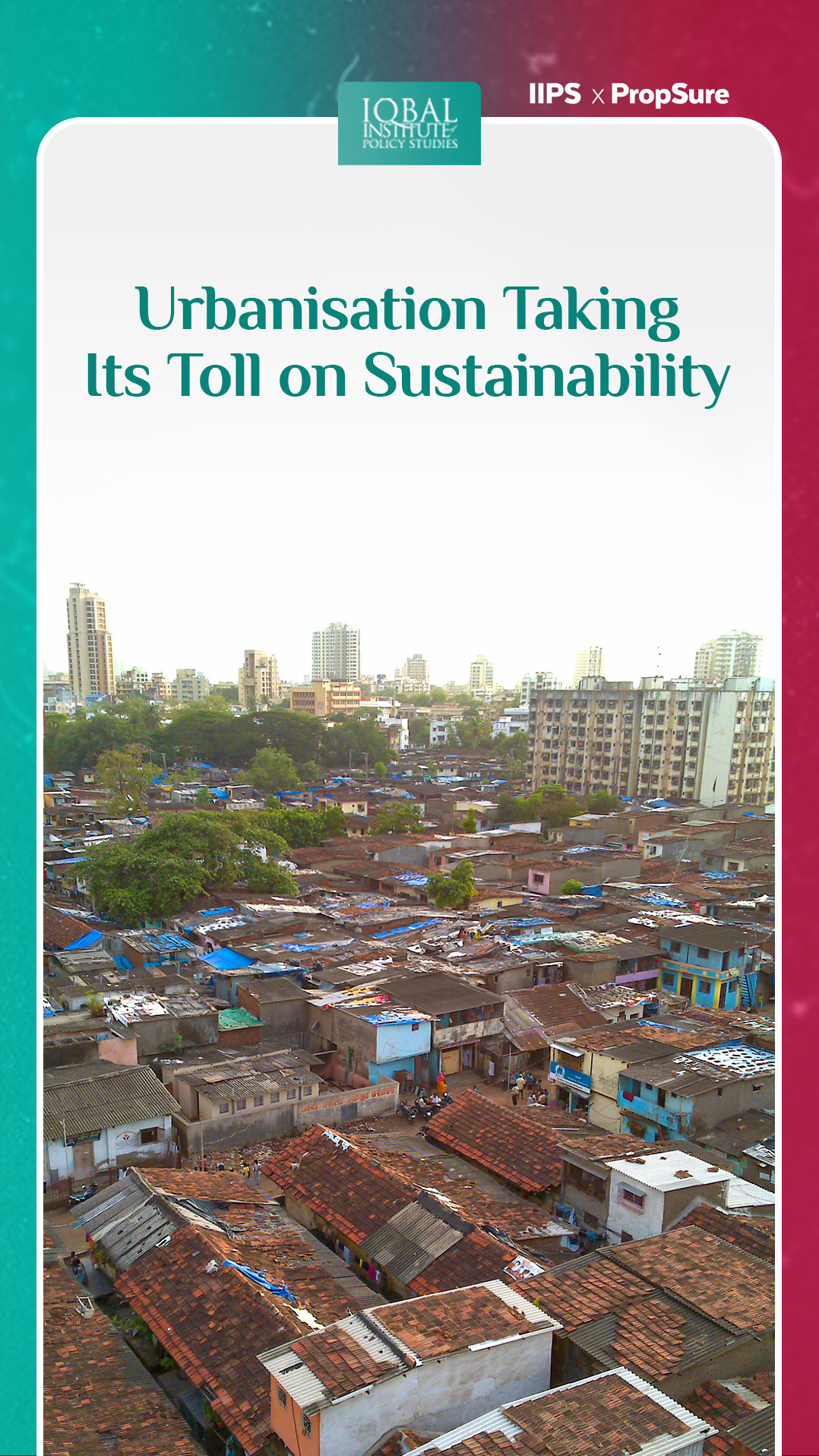Urbanisation has emerged as a powerful global trend having multifaceted socio-economic and environmental consequences. As a phenomenon to promote economic growth and productivity, innovation and knowledge exchange, access to better service infrastructure, cultural diversity, and education and skill development, the rapid urbanisation in Pakistan is creating the opposite impact. As the fastest rapidly urbanising nation in South Asia, where 36.4% of the population lives in urban areas, Pakistan is confronted with many problems associated with an unplanned urbanisation process. Apart from that, the country has one of the highest population growth rates putting greater pressure on urban centres. From an urban sprawl at the cost of fertile agricultural land to the presence of urban slums, poverty and inequality, the heavily strained service infrastructure in the country is not suggestive of a positive relationship between urbanisation and growth.
According to one estimate, nearly half of the country’s inhabitants will live in cities by 2025, putting more pressure on an already choked service infrastructure. More than half of the world’s population (55% in 2017) lives in urban centres, with the projection of it reaching 68% by 2050. It is also estimated that 90% of this increase in the urban populace will take place in Asia and Africa. Therefore, It is extremely vital to understand these urbanisation trends likely to significantly impact the sustainability of development practices, particularly in Pakistan.
This phenomenon of Urbanization is not preventable and requires careful policy formulation and effective implementation. To this end, it is mandatory to have the requisite paraphernalia to manage and plan our highly accelerated urbanisation process to usher in greater economic productivity and well-being. To convert Pakistan’s Urbanization from a problem to progress, people at the helm of affairs must frame and implement effective urban planning strategies serving as a key. Formulation of comprehensive master plans to ensure the provision of adequate infrastructure such as roads, water supply, sanitation, and waste management systems is a sine qua non. It is extremely necessary to encourage and incorporate sustainable and inclusive urban design principles that prioritise green spaces, walkability, and accessibility in the best possible manner.
Housing is another vital area that needs critical attention in relation to our urbanisation experience. In the presence of an incredibly large housing deficit of nearly 10 million that is already growing in the absence of requisite supply, it is highly desirable to promote affordable housing options for urban dwellers. This can be achieved through initiatives such as public-private partnerships, incentivising developers to build affordable housing, and implementing housing finance schemes for low-income individuals. It is also important to encourage the development of social housing projects and slum upgradation programs to improve living conditions in informal settlements.
Another important aspect is to take necessary measures to endeavour better governance structures and institutional capacity to deal with urbanisation as an opportunity. It will certainly help enhance coordination between different government departments and promote transparency and accountability in urban management. The capacity of local authorities to plan, regulate, and manage urban growth effectively will likely be enhanced through these interventions.
Rapid urbanisation is also causing our transportation networks to be compromised in the wake of ever-increasing demand. Developing and improving public transportation systems in an effort to reduce traffic congestion, air pollution, and carbon emissions will definitely serve the cause of sustainability. Investing in mass transit options in cities like Lahore, Islamabad, and Peshawar are the few steps taken in the right direction. In addition to that, the promotion of non-motorised transportation infrastructure, including pedestrian-friendly pathways and cycling lanes, is desperately needed to reclaim our urban centres as inclusive communities.
It is also vital to focus on devising strategies aimed at strengthening basic services by providing improved and equitable access to quality education and healthcare in the wake of inflated urban centres. The equitable distribution of resources and services will undoubtedly convert this urbanisation process into an opportunity for enhanced economic productivity and growth. Economic diversification through the promotion of entrepreneurship and the support of small and medium-sized enterprises is likely to bring increased economic and employment opportunities in the wake of rapid urbanisation. Additionally, Environmental Sustainability also needs to be catered to in the aftermath of the unmanaged and unplanned urbanisation process. The only way to ensure environmental sustainability is to integrate environmental considerations into urban planning and development practices in Pakistan. It includes sustainable waste management practices, air and water pollution mitigation, and the protection of green spaces and natural resources. To this end, it is also highly desirable to encourage energy-efficient building designs and the use of renewable energy sources.
In the age of technology, it is also desirable to utilise data and technology for evidence-based urban planning and decision-making process taking root. Imarat Group of Companies, as a pioneer private sector entity in Pakistan, is taking the lead with the help of platforms like PropSure Digital Solutions, capable of Implementing smart city initiatives to improve efficiency in service delivery, resource management, and urban governance. With the development of digital data collection systems and infrastructure, monitoring and evaluating urbanisation processes, informing policy development, and addressing emerging challenges will become extremely effortless.
Solving the problems of rapid urbanisation in Pakistan demands a multi-pronged and long-term approach that involves collaboration between government agencies, private sector entities, civil society organisations, and local communities. It is crucial to prioritise sustainability, inclusivity, and social equity to ensure that urbanisation will improve economic productivity and human well-being. Sustainable urban development practices and effective governance are crucial to ensure that rapid urbanisation will occur balanced and equitably.
This article is written by Syed Mubasher Gillani. Mubasher is a Content Writer at the PropSure Digital Solutions Pvt Limited.



Leave a Reply